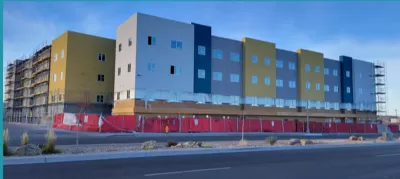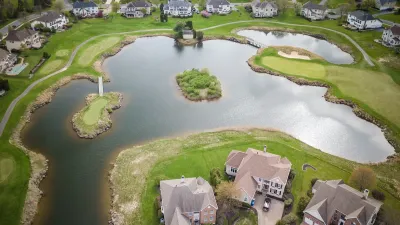Western states that hold millions of acres in land trusts are working to turn some of them into affordable housing.

As the affordable housing crisis grows, states in the Western U.S. are looking to underutilized state-owned lands as potential sites for new housing development, reports Alex Brown in Stateline.
Many of the properties in question were granted to states as “working lands” designed to fund public schools and community services by “leasing them for activities such as logging, mining, grazing and oil and gas development,” and, more recently, renewable energy farms, campgrounds, and other uses.
The process has its own unique challenges. “State land agencies often lack the expertise to develop land themselves, and requirements that they sell parcels for market rates often mean affordable projects are priced out. Officials are still figuring out which mechanisms — leases, land exchanges with local governments, auctions to developers — might work best for getting housing built.” While much of this land isn’t suitable for housing, and some protects critical habitats or other sensitive environments, state leaders see it as an opportunity to diversify their revenue streams and build much-needed housing by making it easier to build on sites near current development.
In Colorado, a new Public-Private Partnership Collaboration Unit formed by the state will support building housing on state-owned land through financing and technical assistance. “Utah has begun looking at ways to promote affordable housing on trust lands, including working with local governments to enact zoning changes that allow increased density.” In New Mexico, an affordable senior housing facility built on trust land opened last year.
FULL STORY: Western states look to these lands for new affordable housing

Alabama: Trump Terminates Settlements for Black Communities Harmed By Raw Sewage
Trump deemed the landmark civil rights agreement “illegal DEI and environmental justice policy.”

Study: Maui’s Plan to Convert Vacation Rentals to Long-Term Housing Could Cause Nearly $1 Billion Economic Loss
The plan would reduce visitor accommodation by 25% resulting in 1,900 jobs lost.

Why Should We Subsidize Public Transportation?
Many public transit agencies face financial stress due to rising costs, declining fare revenue, and declining subsidies. Transit advocates must provide a strong business case for increasing public transit funding.

Wind Energy on the Rise Despite Federal Policy Reversal
The Trump administration is revoking federal support for renewable energy, but demand for new projects continues unabated.

Passengers Flock to Caltrain After Electrification
The new electric trains are running faster and more reliably, leading to strong ridership growth on the Bay Area rail system.

Texas Churches Rally Behind ‘Yes in God’s Back Yard’ Legislation
Religious leaders want the state to reduce zoning regulations to streamline leasing church-owned land to housing developers.
Urban Design for Planners 1: Software Tools
This six-course series explores essential urban design concepts using open source software and equips planners with the tools they need to participate fully in the urban design process.
Planning for Universal Design
Learn the tools for implementing Universal Design in planning regulations.
Caltrans
Smith Gee Studio
Institute for Housing and Urban Development Studies (IHS)
City of Grandview
Harvard GSD Executive Education
Toledo-Lucas County Plan Commissions
Salt Lake City
NYU Wagner Graduate School of Public Service





























